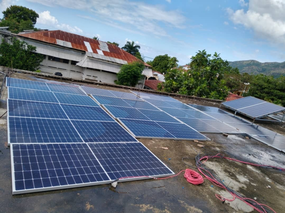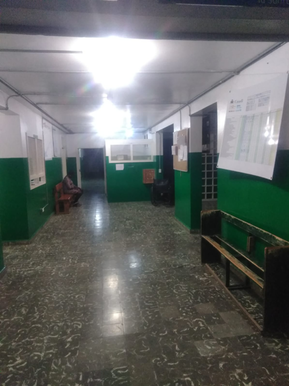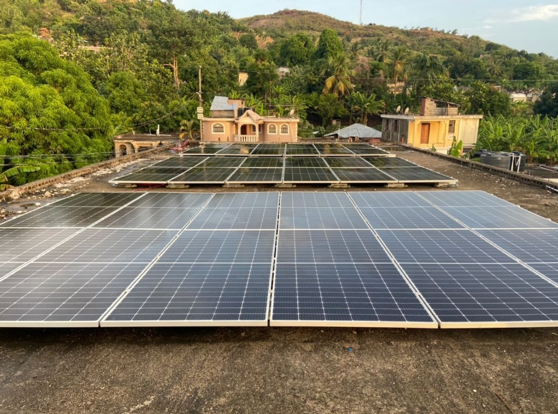 Solar panels (pre-racking) on the roof of Dispensaire Roger Paradis in Tiburon Solar panels (pre-racking) on the roof of Dispensaire Roger Paradis in Tiburon It was a blue-sky break from the rain on February 21st, when EarthSpark and Enèji Pwòp staff turned on the new microgrid-connected solar + storage solution at the health clinic “Dispensaire Roger Paradis” in the town of Tiburon. The 16.2 kWp / 77 kWh solar + storage system builds off of EarthSpark’s initial support for the clinic following the August 2021 earthquake, and was designed to provide reliable power to the downtown clinic and neighboring telecommunications tower. Different from a typical microgrid connection, this novel “distributed energy resource” (DER) on-site at a facility providing critical community services is designed to continue functioning *even if the larger microgrid were to be damaged*. Existing in the context of hurricanes and earthquakes, the EarthSpark grids have done very well overall in the face of natural disasters, but hardening the infrastructure even further for critical facilities is a strategic way to further improve the resiliency of those critical services and eliminate their reliance on their incredibly burdensome, unreliable, and expensive diesel generators. The commissioning of the new solar installation marked the culmination of EarthSpark’s long-running collaboration with the GSMA Mobile for Humanitarian Innovation Fund through which EarthSpark has been working to improve the capacity of communities hosting solar microgrids to absorb and adapt to disasters. Back in 2019 when the project launched, we had not yet faced COVID-19, the presidential assassination, the rise of kidnappings and impassibility of the roads connecting the South to the capital, the fuel crises, or the earthquake that rocked the region. Time delivered plenty of opportunities for EarthSpark to stress and validate our hypothesis, and to adapt accordingly.  Microgrid power online in the Les Anglais Hospital Microgrid power online in the Les Anglais Hospital Distributed Energy Solutions to Build Resilience for Critical Community Services Flipping the switch at the solar+storage solution in Tiburon marked EarthSpark's first directly service to a healthcare customer. It was also EarthSpark's first installation of a DER in one of our microgrids. This is now our foundation for designing and expanding service to other critical healthcare facilities in other grids. After EarthSpark had begun work in Tiburon, the hospital in Les Anglais also requested service. So far, that hospital has been connected to microgrid service, with the goal of eventually installing distributed solar+storage solution there as well. The Tiburon health facility DER also significant in validating a more distributed grid topography for future grids – this has the potential to reduce costs and increase resilience for future grids. This approach will need to be replicated and scaled extensively across other planned microgrids to help support EarthSpark’s vision of 100% renewable microgrids. At the outset of the GSMA Foundation collaboration, EarthSpark was also able to connect a total of three telecommunications towers from the national providers, Digicel and Natcom, across the Les Anglais and Tiburon microgrids. This not only improved the reliability of electricity service for the towers – and therefore the reliability of the telecommunications services – but also improved the financial viability of the microgrid model by creating key anchor customers for the microgrids. In fact, since the start of 2021, the two telecommunications towers in Les Anglais have accounted for approximately 18% of total electricity consumption and about 28% of total electricity revenue for the microgrid. This highlights the strategic importance of telecommunications towers not just as a critical community service, but also as a cornerstone for planning and expanding microgrids in Haiti. Mobile-Enabled Solutions and New Energy Access for Households and Small Businesses Through the GSMA project, EarthSpark also launched several mobile services to improve service, customer experience, and overall microgrid operations including:
As the EarthSpark team works to finalize concession documents and financing for the next 6 grids, these learnings and tools will be invaluable in not only improving operations in Les Anglais and Tiburon but also in designing better, more cost-effective and more resilient energy systems for the future towns than would have otherwise been possible. A big thanks to the GSMA Foundation Mobile for Humanity for supporting this work!
0 Comments
Your comment will be posted after it is approved.
Leave a Reply. |
EarthSpark supporters make our work possible. Thank you for considering a donation towards eliminating energy poverty in Haiti.
Read the full blog - click here!
|
EarthSpark International is a non-profit 501(c)3 organization.

